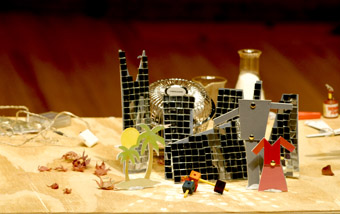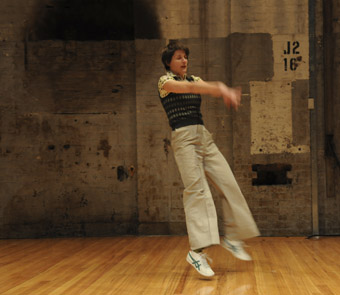But her latest work, Fraudulent Behaviour, is twice the usual duration and, with her distinctive style adapted to a more sustainable, often whimsical and, at points, almost meditative pace, it marks a departure for Dennis.
Exploring the human predisposition for hurtful lies and harmless un-truths this work has an ironically honest quality, both in content and delivery. Yet there is a strong sense of the surreal in Fraudulent Behaviour. Through bizarrely down-to-earth conversations with a rubber duck and long-time invisible friend Elvira, and child-like storytelling via a rudimentary puppet show, Dennis breathes life into the truism that ‘truth is stranger than fiction.'
Amid these exchanges—Dennis and duck, Dennis and audience, Dennis and neurotic Dennis—subtle nuances, rhythmic repetition and a sharp sense of humour highlight the infinite instances in which we utilise deception. “I love that, I lurve that, I LOVE that”, she exclaims, and we snigger, caught out, wondering the number of times and ways we have already said that today.
 |
Set detail, Rosie Dennis, Fraudulent Behaviour, Performance Space photo by Heidrun Löhr |
In an interview in 2006, "Confessions of a fast talker," Dennis described herself as “difficult to program" due to her falling between categorisations of dance and theatre, and the reluctance of arts organisations, especially in Australia, to schedule short works. The idea of producing longer, 45-60 minute performances was an issue of creative integrity: “I don’t want to do that, I want to be true to what I enjoy,” she explained.
It seems fitting then, that a work about our relationship to truth asks if Dennis is still being true to herself by making it. Of course, what Fraudulent Behaviour serves to illustrate is that we need lies in order to live, because truth is subject to change. Only lies are reliable.
confessions of a fast talker
keith gallasch talks with improviser rosie dennis
anamorphic srchive: the rosie dennis file
martin del amo
rosie dennis: one from the heart
winnie love
 |
Rosie Dennis, Fraudulent Behaviour, Performance Space photo by Heidrun Löhr |
Rosie Dennis, Fraudulent Behaviour, Performance Space, Carriageworks, Sydney, June 11-13
Fraudulent Behaviour, video excerpt © Rosie Dennis, Sam James 2009, reproduced with the permission of the artists.
© Josephine Skinner; for permission to reproduce apply to [email protected]








 back
back